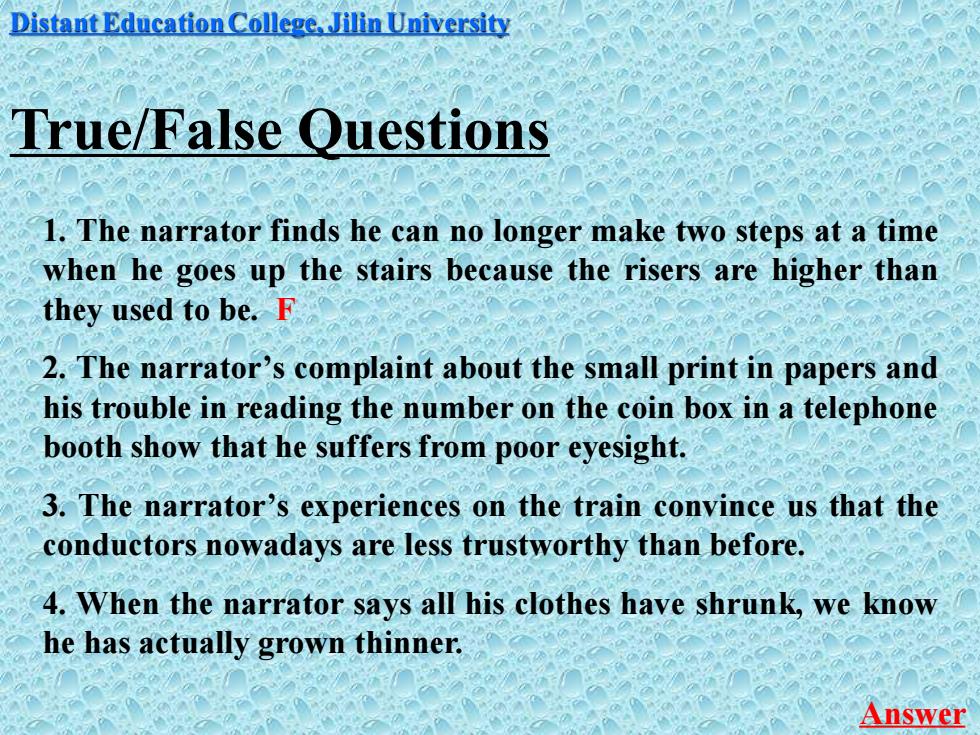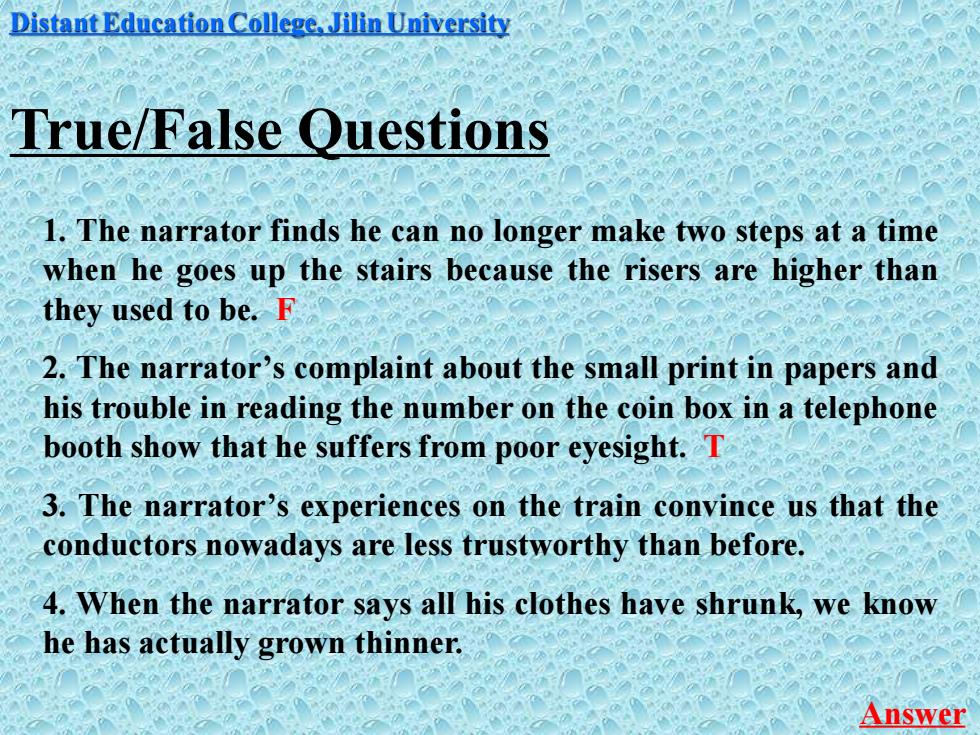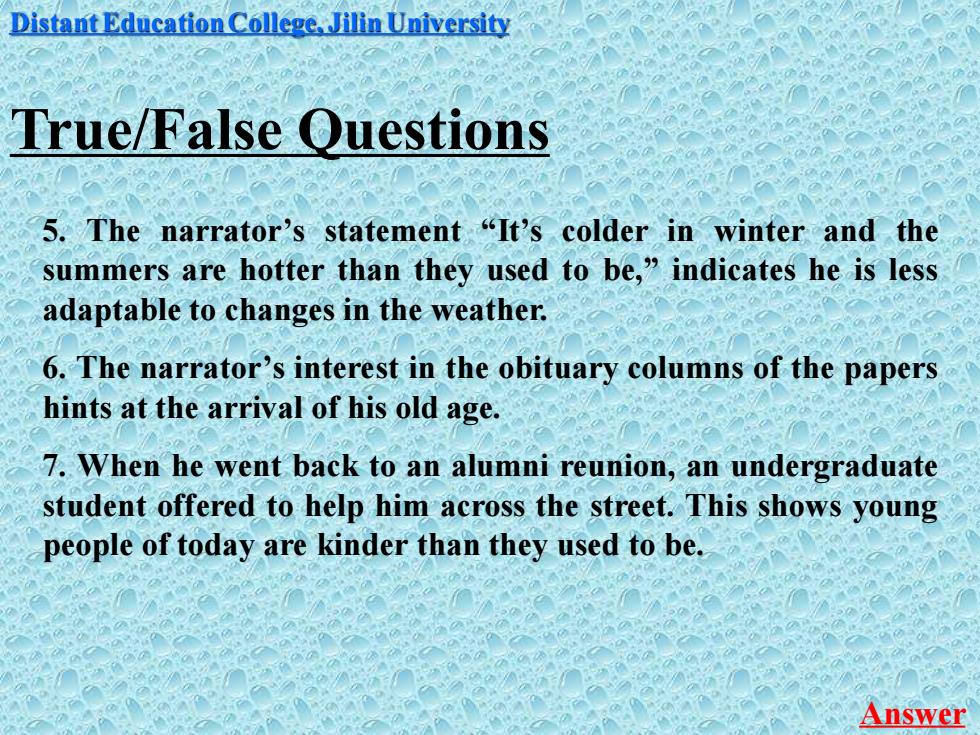
Distant Education College,Jilin University True/False Questions 1.The narrator finds he can no longer make two steps at a time when he goes up the stairs because the risers are higher than they used to be.F 2.The narrator's complaint about the small print in papers and his trouble in reading the number on the coin box in a telephone booth show that he suffers from poor eyesight. 3.The narrator's experiences on the train convince us that the conductors nowadays are less trustworthy than before. 4.When the narrator says all his clothes have shrunk,we know he has actually grown thinner. Answer
1. The narrator finds he can no longer make two steps at a time when he goes up the stairs because the risers are higher than they used to be. F 2. The narrator’s complaint about the small print in papers and his trouble in reading the number on the coin box in a telephone booth show that he suffersfrom poor eyesight. 3. The narrator’s experiences on the train convince us that the conductors nowadays are less trustworthy than before. 4. When the narrator says all his clothes have shrunk, we know he has actually grown thinner. True/False Questions Distant Education College, Jilin University Answer

Distant Education College,Jilin University True/False Questions 1.The narrator finds he can no longer make two steps at a time when he goes up the stairs because the risers are higher than they used to be.F 2.The narrator's complaint about the small print in papers and his trouble in reading the number on the coin box in a telephone booth show that he suffers from poor eyesight.T 3.The narrator's experiences on the train convince us that the conductors nowadays are less trustworthy than before. 4.When the narrator says all his clothes have shrunk,we know he has actually grown thinner. Answer
1. The narrator finds he can no longer make two steps at a time when he goes up the stairs because the risers are higher than they used to be. F 2. The narrator’s complaint about the small print in papers and his trouble in reading the number on the coin box in a telephone booth show that he suffersfrom poor eyesight. T 3. The narrator’s experiences on the train convince us that the conductors nowadays are less trustworthy than before. 4. When the narrator says all his clothes have shrunk, we know he has actually grown thinner. True/False Questions Distant Education College, Jilin University Answer

Distant Education College,Jilin University True/False Questions 1.The narrator finds he can no longer make two steps at a time when he goes up the stairs because the risers are higher than they used to be.F 2.The narrator's complaint about the small print in papers and his trouble in reading the number on the coin box in a telephone booth show that he suffers from poor eyesight.T 3.The narrator's experiences on the train convince us that the conductors nowadays are less trustworthy than before.F 4.When the narrator says all his clothes have shrunk,we know he has actually grown thinner. Answer
1. The narrator finds he can no longer make two steps at a time when he goes up the stairs because the risers are higher than they used to be. F 2. The narrator’s complaint about the small print in papers and his trouble in reading the number on the coin box in a telephone booth show that he suffersfrom poor eyesight. T 3. The narrator’s experiences on the train convince us that the conductors nowadays are less trustworthy than before. F 4. When the narrator says all his clothes have shrunk, we know he has actually grown thinner. True/False Questions Distant Education College, Jilin University Answer

Distant Education College,Jilin University True/False Questions 1.The narrator finds he can no longer make two steps at a time when he goes up the stairs because the risers are higher than they used to be.F 2.The narrator's complaint about the small print in papers and his trouble in reading the number on the coin box in a telephone booth show that he suffers from poor eyesight.T 3.The narrator's experiences on the train convince us that the conductors nowadays are less trustworthy than before.F 4.When the narrator says all his clothes have shrunk,we know he has actually grown thinner.F More
1. The narrator finds he can no longer make two steps at a time when he goes up the stairs because the risers are higher than they used to be. F 2. The narrator’s complaint about the small print in papers and his trouble in reading the number on the coin box in a telephone booth show that he suffersfrom poor eyesight. T 3. The narrator’s experiences on the train convince us that the conductors nowadays are less trustworthy than before. F 4. When the narrator says all his clothes have shrunk, we know he has actually grown thinner. F True/False Questions Distant Education College, Jilin University More

Distant Education College,Jilin University True/False Questions 5.The narrator's statement "It's colder in winter and the summers are hotter than they used to be,"indicates he is less adaptable to changes in the weather. 6.The narrator's interest in the obituary columns of the papers hints at the arrival of his old age. 7.When he went back to an alumni reunion,an undergraduate student offered to help him across the street.This shows young people of today are kinder than they used to be. Answer
5. The narrator’s statement “It’s colder in winter and the summers are hotter than they used to be,” indicates he is less adaptable to changes in the weather. 6. The narrator’s interest in the obituary columns of the papers hints at the arrival of his old age. 7. When he went back to an alumni reunion, an undergraduate student offered to help him across the street. This shows young people of today are kinder than they used to be. True/False Questions Distant Education College, Jilin University Answer